人教版八年级上Unit 5 Do you want to watch a game show?Section A第1课时课件(共47张PPT)
文档属性
| 名称 | 人教版八年级上Unit 5 Do you want to watch a game show?Section A第1课时课件(共47张PPT) |
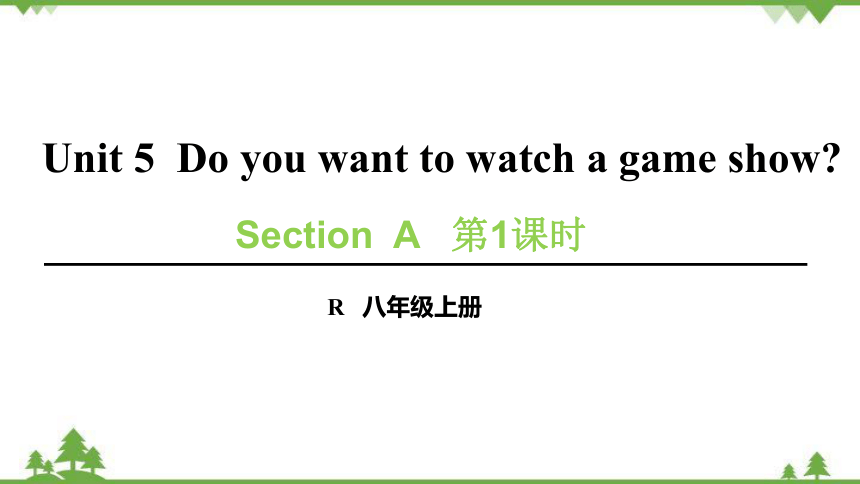
|
|
| 格式 | ppt | ||
| 文件大小 | 35.9MB | ||
| 资源类型 | 教案 | ||
| 版本资源 | 人教新目标(Go for it)版 | ||
| 科目 | 英语 | ||
| 更新时间 | 2022-07-20 00:00:00 | ||
图片预览

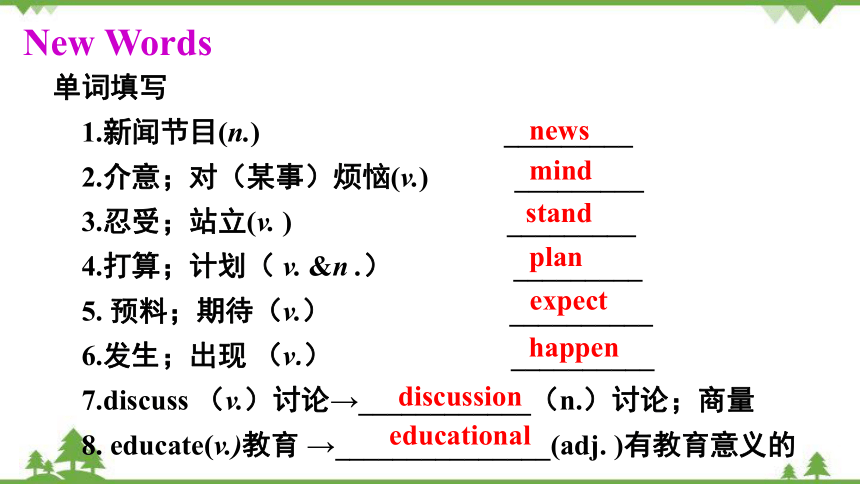
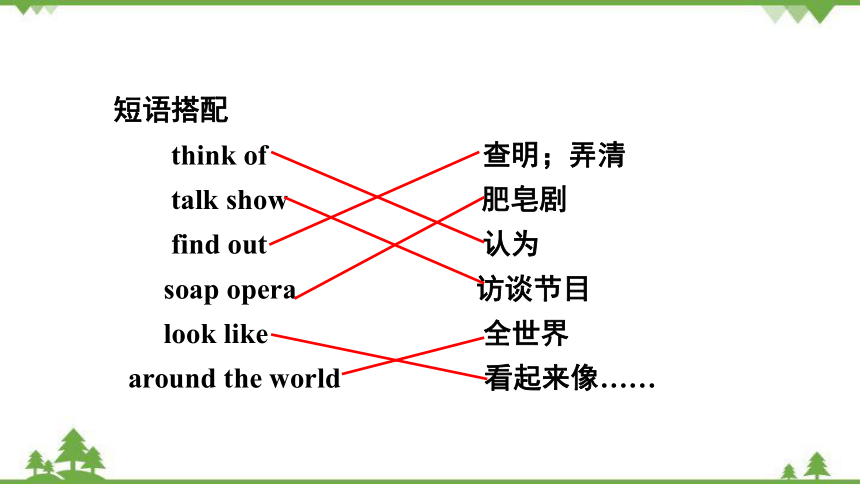
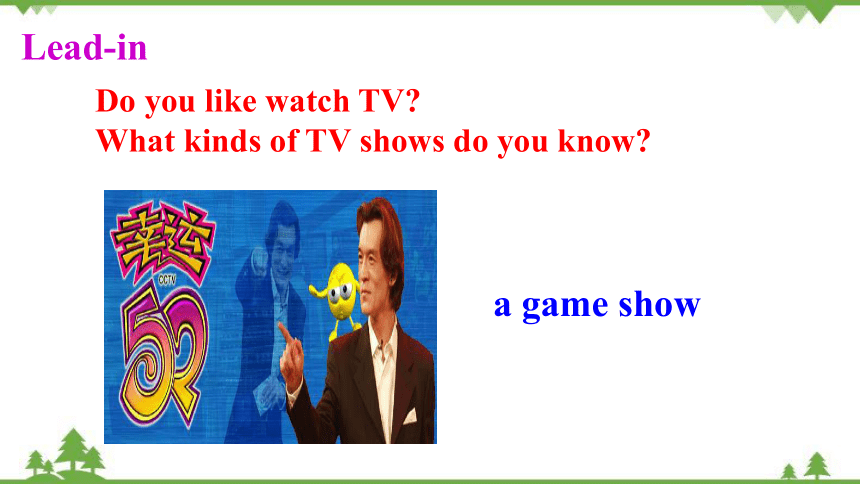
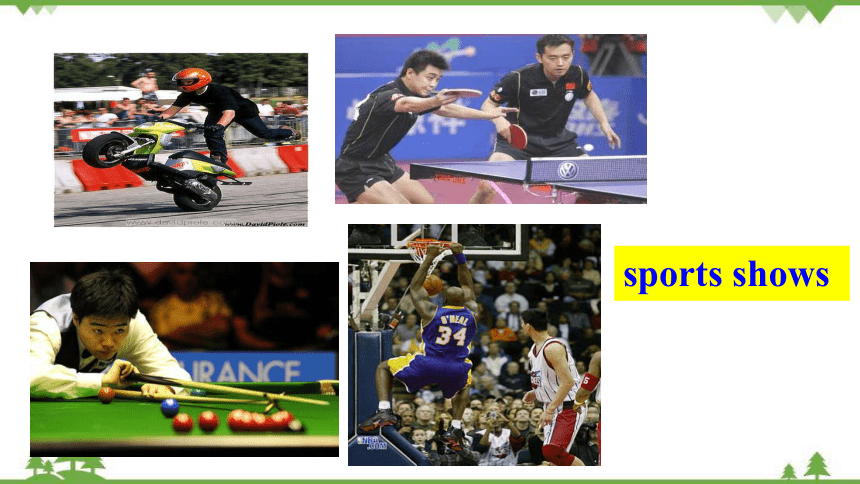

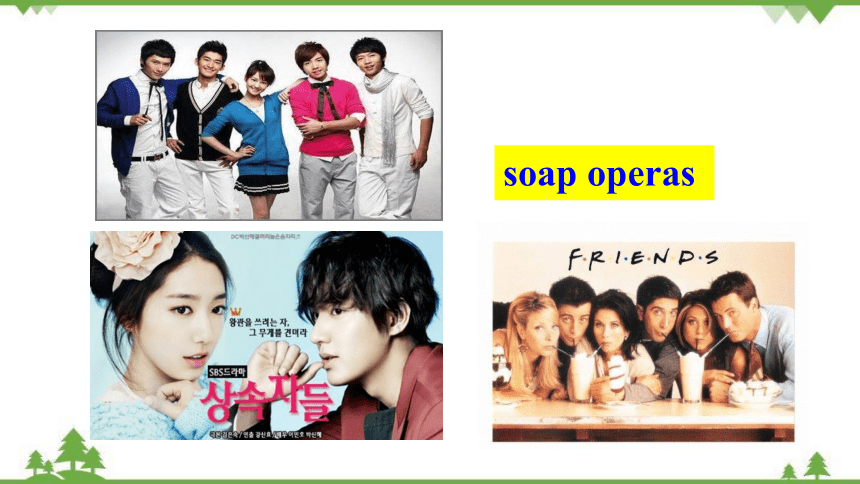

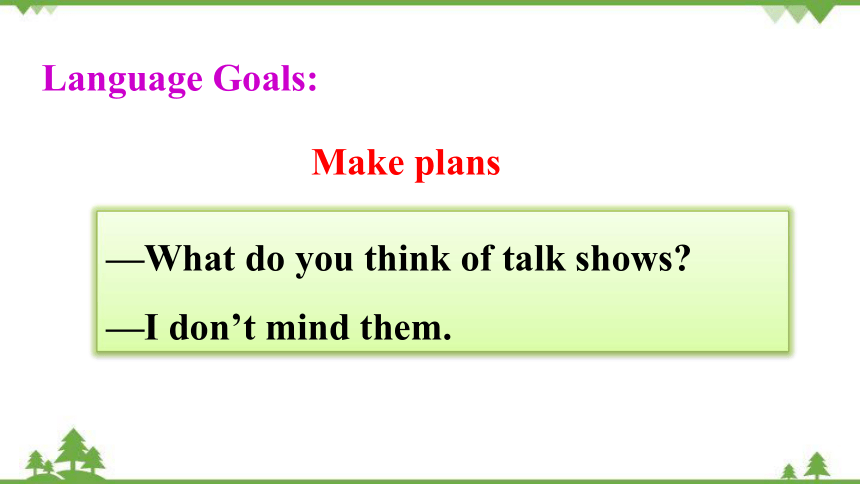
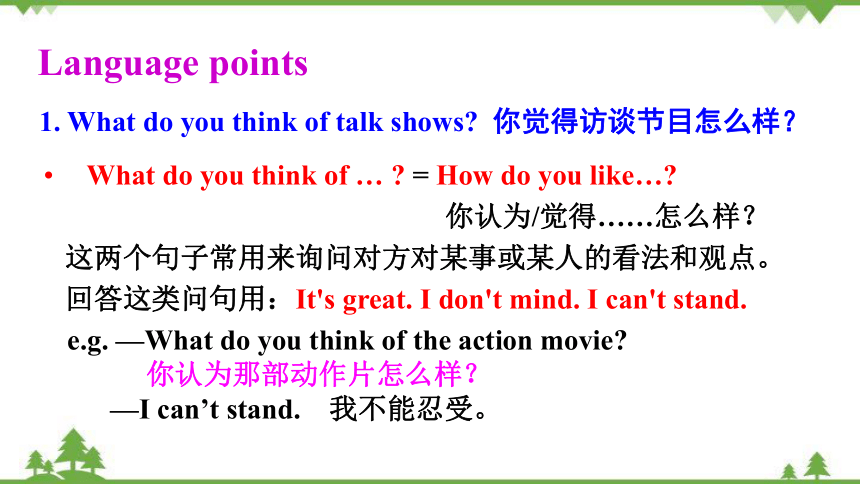
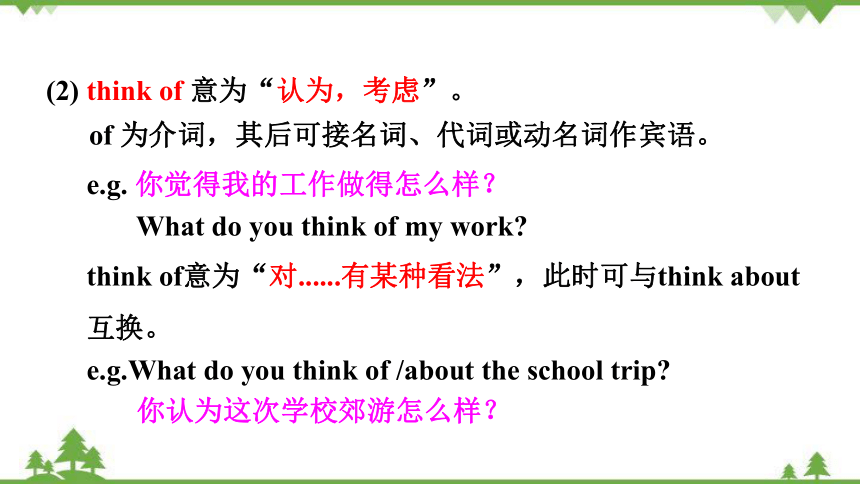
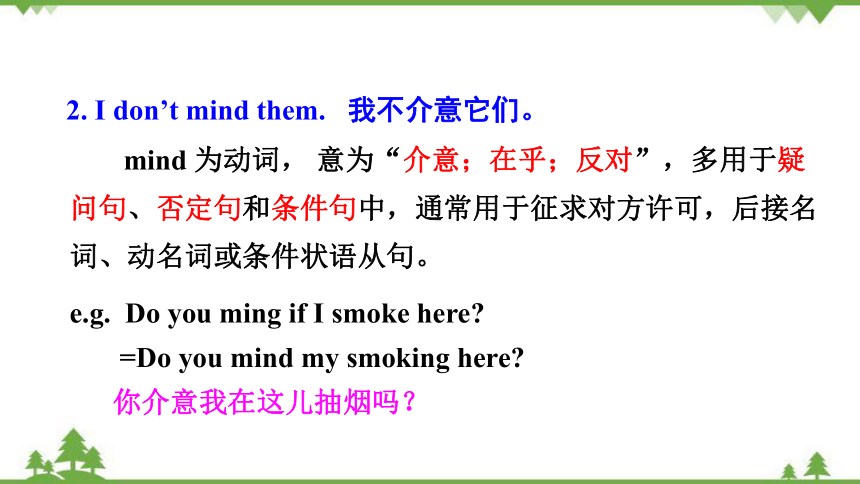
文档简介
(共47张PPT)
Unit 5 Do you want to watch a game show
R 八年级上册
Section A 第1课时
New Words
单词填写
1.新闻节目(n.) _________
2.介意;对(某事)烦恼(v.) _________
3.忍受;站立(v. ) _________
4.打算;计划( v. &n .) _________
5. 预料;期待(v.) __________
6.发生;出现 (v.) __________
7.discuss (v.)讨论→____________(n.)讨论;商量
8. educate(v.)教育 →_______________(adj. )有教育意义的
news
mind
stand
expect
plan
discussion
educational
happen
短语搭配
think of 查明;弄清
talk show 肥皂剧
find out 认为
soap opera 访谈节目
look like 全世界
around the world 看起来像……
Lead-in
Do you like watch TV
What kinds of TV shows do you know
a game show
sports shows
talk shows
soap operas
news
—What do you think of talk shows
—I don’t mind them.
Make plans
Language Goals:
1. What do you think of talk shows 你觉得访谈节目怎么样?
What do you think of … = How do you like…
你认为/觉得……怎么样?
这两个句子常用来询问对方对某事或某人的看法和观点。
回答这类问句用:It's great. I don't mind. I can't stand.
e.g. —What do you think of the action movie
你认为那部动作片怎么样?
—I can’t stand. 我不能忍受。
Language points
(2) think of 意为“认为,考虑”。
of 为介词,其后可接名词、代词或动名词作宾语。
e.g. 你觉得我的工作做得怎么样?
What do you think of my work
think of意为“对......有某种看法”,此时可与think about互换。
e.g.What do you think of /about the school trip
你认为这次学校郊游怎么样?
2. I don’t mind them. 我不介意它们。
mind 为动词, 意为“介意;在乎;反对”,多用于疑问句、否定句和条件句中,通常用于征求对方许可,后接名词、动名词或条件状语从句。
e.g. Do you ming if I smoke here
=Do you mind my smoking here
你介意我在这儿抽烟吗?
1a
Match the TV shows with the pictures [a-g].
1. talk show 5. game show
2. soap opera 6. talent show
3. sports show 7. news
4. sitcom
e
d
b
c
a
g
f
1b
Listen and number the shows [1-4] in the order you hear them.
talent show talk show
soccer game news
1
2
3
4
1c
Practice the conversation. Then make your own conversations.
A: What do you want to watch
B: What do you think of talk shows
A: They’re OK. I don’t mind them.
B: Then let’s watch a talk show.
love like
don’t mind don’t like
can’t stand
What do you want to watch
What do you think of talk shows
They’re OK. I don’t mind them.
Then let’s watch a talk show.
What do you want to watch
What do you think of sports shows
Oh, I can’t stand it.
Well, what about sitcom
OK. I like it.
I can’t stand them. 我不能忍受他们。
(1) stand在此意为“忍受,经受”,后面跟名词、代词或动名词作宾语。它也可用于否定句和疑问句,与can /could 连用。
e.g. I can’t stand the weather here.
我忍受不了这里的天气。
(2) stand作动词,还可以为“站立”。
e.g. Stand up, please. 请站起来。
Language points
A: What do you think of game shows
B: I love them.
A: Why do you love them
B: Because they are exciting.
sports shows
talk shows…
like/don’t mind
funny/boring/
relaxing…
Survey and report
Ask your classmates.
Game shows Sports shows News Soap
operas Sitcoms Talk
shows
I
Mary
Report : I love game shows, because I think they are so relaxing, but my friend Mary likes soap operas and talk shows, because she thinks they are fun. …
2a
Listen to Lin Hui and Sally’s conversation. Number the TV shows [1-5] in the order you hear them.
___ sitcoms ___ news
___ game shows ___ talk shows
___ soap operas
5
4
2
3
1
2b
Listen again. Complete the sentences.
1. Sally likes to watch .
2. Lin Hui thinks she can learn from
sitcoms.
3. Sally thinks are more educational
than sitcoms.
4. Sally loves . She plans to watch Days of Our
Past .
the news or talk shows
some great jokes
game shows
soap operas
tonight
Language points
Lin Hui thinks she can learn ______ from sitcoms.
林慧认为她能从情景喜剧中学到……
learn…from…意为“从……中学习……;从……获得……”。
该短语多用于两种情况:learn from sb./sth.或learn sth. from sb./sth.
e.g. What can you learn from the story
从这个故事中你能学习到什么呢?
拓展:
(1)learn to do sth.意为“学习做某事”。
例句:I want to learned to play the piano.
我想学习弹钢琴。
(2)learn…by oneself.意为“自学”,同义短语:teach oneself。
例句:The man can learn English by himself.
这个人能自学英语。
(3)learn about.意为“了解”。
例句:We should learn more about Chinese history.
我们应该更多地了解中国历史。
2c
Ask and answer questions about the TV shows in 2a. Use information that is true for you.
A: Do you plan to watch the news tonight
B: Yes. I like watching the news. I watch it every night.
A: Why
B: Because I hope to find out what’s going on around the
world.
Language points
Because I hope to find out what’s going on around the world.
因为我希望了解世界各地正在发生的事情。
hope作动词,意为“希望;期望”,其后一般接动词不定式或宾语从句,但不能接名词、动名词作宾语,也不能接复合宾语。
常用结构:hope to do sth. 意为“希望做某事”;还能接that引导的从句,意为“希望……”。
【注意】 hope可与so或not连用,分别代替一个具有肯定和否定意义的宾语从句,以免重复。
e.g. — Will it be fine tomorrow 明天天气好吗?
— I hope so. 我希望如此。
e.g. 我希望马上宣布胜利者的名字。
I hope to announce the winner shortly.
我希望你能更加努力学习。
I hope that you can study harder.
动词词组,意为“查明;弄清”,强调经过调查、询问、打听、研究等一番努力或曲折之后才搞清楚、弄明白。
意为“找到;发现”,通常指找到或发现具体的东西,也可指偶然发现某物或某种情况,强调“寻找”的结果。
find out是动词词组,意为“查明;弄清”,强调经过
一番过程,经了解和查询而搞清楚,弄明白某一情况。
e.g. Can you find out who broke the glass
你能查明是谁打破了玻璃杯吗?
find out与find
find out:
find :
Do you plan to watch the news tonight
Yes. I like watching the news. I watch it every night.
Why
Because I hope to find out what’s going on around the world.
Role play
Do you want to watch game shows
Yes. I like watching game shows. I watch them three times a week.
Why
Because I …
2d
Role-play the conversation.
Read the conversion and answer.
What did Sarah do in class today
Does Grace like soap operas Why
What does Sarah think of soap operas
Why does Sarah like news and talk shows best
Grace: What did you do in class today, Sarah
Sarah: We had a discussion about TV shows. My classmates
like game shows and sports shows.
Grace: Oh, I can’t stand them. I love soap operas. I like to
follow the story and see what happens next.
Sarah: Well, I don’t mind soap operas. But my favorite TV
shows are the news and talk shows.
Grace: They’re boring!
Sarah: Well, they may not be very exciting, but you can
expect to learn a lot from them. I hope to be a TV
reporter one day.
soap operas肥皂剧
one day有一天
reporter记者
What did Sarah do in class today
Does Grace like soap operas Why
What does Sarah think of soap operas
Why does Sarah like news and talk shows best
She had a discussion about TV shows.
Because she can expect to learn a lot from them. And she wants to be a TV reporter one day.
She doesn't mind soap operas.
Yes. She likes to follow the story and see what happens next.
Language points
1.I like to follow the story and see what happens next.
我喜欢跟随故事情节了解接下来要发生的事情。
happen是不及物动词,意为“发生;出现”。
happen的用法主要有以下三种:
(1)sth. +happen+地点/时间 某地/某时发生了某事
e.g. An accident happened in that street.
那条街上发生了一起事故。
What’s happening outside
外面发生什么事了?
(2)sth.+ happen to +sb.
某人出了某事(常指不好的事发生在某人身上)
e.g. A car accident happened to him yesterday.
昨天他发生了交通事故。
What happened to you 你怎么啦?
=What was wrong / the matter with you
(3)sb.+ happen+ to do sth. 某人碰巧做某事
e.g. I happened to meet her in the street.
我碰巧在街上遇见她。
happen与take place
happen 意为“发生;碰巧”,一般用于偶然或突发性事件。 He happened to know the place.
take place 表示“发生;举行;举办”,一般指非偶然性事件的“发生”,即这种事件的发生一定有某种原因或事先的安排。 The meeting will take place soon.
2.Well, they may not be very exciting, but you can expect to
learn a lot from them. 哦,它们可能不是很精彩,但是
你可以期望从中学到很多(知识)。
may是情态动词,意为“可能;也许;大概”。表示推测,一般用于肯定句中。
e.g. —Where is Julia 朱莉娅在哪里?
—She may be in the garden. 她可能在花园里。
They may go to the beach next week.
他们可能下周去海滩。
expect作动词,意为“期待;预料”,一般有以下用法:
(1)expect+名词/代词,意为“期待某事(物)或某人;预
计……可能发生”。
e.g. I expect a storm. 我预料会有一场暴风雨。
We are expecting a rise in food prices this month.
我们预计这个月食物价格会上涨。
(2)expect to do sth. 意为“预计做某事”。
e.g. I expect to finish reading this book before next Tuesday.
我预计下星期二以前把这本书读完。
(3)expect sb.to do sth.意为“期望某人做某事”。
e.g. 我期待着你给我打电话。
I’m expecting you to telephone me.
老师期望我们努力学习。
The teacher expects us to work hard.
(4)expect +从句,意为“预计……”。
e.g. 我预计下周一回来。
I expect that I’ll come back next Monday.
( )1. _____ to him yesterday
A. What did happen B. What did he happen
C. What happened
( )2. The girl is not at school now. She ____ at home.
A. maybe B. mag is C. may be
( )3. My sister is not good at English, I hope ____.
A. you to help her B. you help she C. to help her
C
C
C
单项选择。
Exercise
( )4. Can you learn ____ from the man
A. a lot B. lots of C. a lot of
( )5. What ____ he ____ of sports shows
A. do, think B. do, thinks
C. does, think D. does, thinks
( )6. Her brother says he can't ____ the wallet.
A. think B. like C. stand D. stands
A
C
C
用所给词的适当形式填空
1. Peter wants (learn) English well.
2. I think soap operas are boring. Let’s (watch)a sports
show.
3. —What do you plan (do)this evening
—To surf the Internet.
4. We are having a (discuss)about hobbies in class.
5. Mr. White expects (have)a good job.
to learn
watch
to do
discussion
to have
Unit 5 Do you want to watch a game show
R 八年级上册
Section A 第1课时
New Words
单词填写
1.新闻节目(n.) _________
2.介意;对(某事)烦恼(v.) _________
3.忍受;站立(v. ) _________
4.打算;计划( v. &n .) _________
5. 预料;期待(v.) __________
6.发生;出现 (v.) __________
7.discuss (v.)讨论→____________(n.)讨论;商量
8. educate(v.)教育 →_______________(adj. )有教育意义的
news
mind
stand
expect
plan
discussion
educational
happen
短语搭配
think of 查明;弄清
talk show 肥皂剧
find out 认为
soap opera 访谈节目
look like 全世界
around the world 看起来像……
Lead-in
Do you like watch TV
What kinds of TV shows do you know
a game show
sports shows
talk shows
soap operas
news
—What do you think of talk shows
—I don’t mind them.
Make plans
Language Goals:
1. What do you think of talk shows 你觉得访谈节目怎么样?
What do you think of … = How do you like…
你认为/觉得……怎么样?
这两个句子常用来询问对方对某事或某人的看法和观点。
回答这类问句用:It's great. I don't mind. I can't stand.
e.g. —What do you think of the action movie
你认为那部动作片怎么样?
—I can’t stand. 我不能忍受。
Language points
(2) think of 意为“认为,考虑”。
of 为介词,其后可接名词、代词或动名词作宾语。
e.g. 你觉得我的工作做得怎么样?
What do you think of my work
think of意为“对......有某种看法”,此时可与think about互换。
e.g.What do you think of /about the school trip
你认为这次学校郊游怎么样?
2. I don’t mind them. 我不介意它们。
mind 为动词, 意为“介意;在乎;反对”,多用于疑问句、否定句和条件句中,通常用于征求对方许可,后接名词、动名词或条件状语从句。
e.g. Do you ming if I smoke here
=Do you mind my smoking here
你介意我在这儿抽烟吗?
1a
Match the TV shows with the pictures [a-g].
1. talk show 5. game show
2. soap opera 6. talent show
3. sports show 7. news
4. sitcom
e
d
b
c
a
g
f
1b
Listen and number the shows [1-4] in the order you hear them.
talent show talk show
soccer game news
1
2
3
4
1c
Practice the conversation. Then make your own conversations.
A: What do you want to watch
B: What do you think of talk shows
A: They’re OK. I don’t mind them.
B: Then let’s watch a talk show.
love like
don’t mind don’t like
can’t stand
What do you want to watch
What do you think of talk shows
They’re OK. I don’t mind them.
Then let’s watch a talk show.
What do you want to watch
What do you think of sports shows
Oh, I can’t stand it.
Well, what about sitcom
OK. I like it.
I can’t stand them. 我不能忍受他们。
(1) stand在此意为“忍受,经受”,后面跟名词、代词或动名词作宾语。它也可用于否定句和疑问句,与can /could 连用。
e.g. I can’t stand the weather here.
我忍受不了这里的天气。
(2) stand作动词,还可以为“站立”。
e.g. Stand up, please. 请站起来。
Language points
A: What do you think of game shows
B: I love them.
A: Why do you love them
B: Because they are exciting.
sports shows
talk shows…
like/don’t mind
funny/boring/
relaxing…
Survey and report
Ask your classmates.
Game shows Sports shows News Soap
operas Sitcoms Talk
shows
I
Mary
Report : I love game shows, because I think they are so relaxing, but my friend Mary likes soap operas and talk shows, because she thinks they are fun. …
2a
Listen to Lin Hui and Sally’s conversation. Number the TV shows [1-5] in the order you hear them.
___ sitcoms ___ news
___ game shows ___ talk shows
___ soap operas
5
4
2
3
1
2b
Listen again. Complete the sentences.
1. Sally likes to watch .
2. Lin Hui thinks she can learn from
sitcoms.
3. Sally thinks are more educational
than sitcoms.
4. Sally loves . She plans to watch Days of Our
Past .
the news or talk shows
some great jokes
game shows
soap operas
tonight
Language points
Lin Hui thinks she can learn ______ from sitcoms.
林慧认为她能从情景喜剧中学到……
learn…from…意为“从……中学习……;从……获得……”。
该短语多用于两种情况:learn from sb./sth.或learn sth. from sb./sth.
e.g. What can you learn from the story
从这个故事中你能学习到什么呢?
拓展:
(1)learn to do sth.意为“学习做某事”。
例句:I want to learned to play the piano.
我想学习弹钢琴。
(2)learn…by oneself.意为“自学”,同义短语:teach oneself。
例句:The man can learn English by himself.
这个人能自学英语。
(3)learn about.意为“了解”。
例句:We should learn more about Chinese history.
我们应该更多地了解中国历史。
2c
Ask and answer questions about the TV shows in 2a. Use information that is true for you.
A: Do you plan to watch the news tonight
B: Yes. I like watching the news. I watch it every night.
A: Why
B: Because I hope to find out what’s going on around the
world.
Language points
Because I hope to find out what’s going on around the world.
因为我希望了解世界各地正在发生的事情。
hope作动词,意为“希望;期望”,其后一般接动词不定式或宾语从句,但不能接名词、动名词作宾语,也不能接复合宾语。
常用结构:hope to do sth. 意为“希望做某事”;还能接that引导的从句,意为“希望……”。
【注意】 hope可与so或not连用,分别代替一个具有肯定和否定意义的宾语从句,以免重复。
e.g. — Will it be fine tomorrow 明天天气好吗?
— I hope so. 我希望如此。
e.g. 我希望马上宣布胜利者的名字。
I hope to announce the winner shortly.
我希望你能更加努力学习。
I hope that you can study harder.
动词词组,意为“查明;弄清”,强调经过调查、询问、打听、研究等一番努力或曲折之后才搞清楚、弄明白。
意为“找到;发现”,通常指找到或发现具体的东西,也可指偶然发现某物或某种情况,强调“寻找”的结果。
find out是动词词组,意为“查明;弄清”,强调经过
一番过程,经了解和查询而搞清楚,弄明白某一情况。
e.g. Can you find out who broke the glass
你能查明是谁打破了玻璃杯吗?
find out与find
find out:
find :
Do you plan to watch the news tonight
Yes. I like watching the news. I watch it every night.
Why
Because I hope to find out what’s going on around the world.
Role play
Do you want to watch game shows
Yes. I like watching game shows. I watch them three times a week.
Why
Because I …
2d
Role-play the conversation.
Read the conversion and answer.
What did Sarah do in class today
Does Grace like soap operas Why
What does Sarah think of soap operas
Why does Sarah like news and talk shows best
Grace: What did you do in class today, Sarah
Sarah: We had a discussion about TV shows. My classmates
like game shows and sports shows.
Grace: Oh, I can’t stand them. I love soap operas. I like to
follow the story and see what happens next.
Sarah: Well, I don’t mind soap operas. But my favorite TV
shows are the news and talk shows.
Grace: They’re boring!
Sarah: Well, they may not be very exciting, but you can
expect to learn a lot from them. I hope to be a TV
reporter one day.
soap operas肥皂剧
one day有一天
reporter记者
What did Sarah do in class today
Does Grace like soap operas Why
What does Sarah think of soap operas
Why does Sarah like news and talk shows best
She had a discussion about TV shows.
Because she can expect to learn a lot from them. And she wants to be a TV reporter one day.
She doesn't mind soap operas.
Yes. She likes to follow the story and see what happens next.
Language points
1.I like to follow the story and see what happens next.
我喜欢跟随故事情节了解接下来要发生的事情。
happen是不及物动词,意为“发生;出现”。
happen的用法主要有以下三种:
(1)sth. +happen+地点/时间 某地/某时发生了某事
e.g. An accident happened in that street.
那条街上发生了一起事故。
What’s happening outside
外面发生什么事了?
(2)sth.+ happen to +sb.
某人出了某事(常指不好的事发生在某人身上)
e.g. A car accident happened to him yesterday.
昨天他发生了交通事故。
What happened to you 你怎么啦?
=What was wrong / the matter with you
(3)sb.+ happen+ to do sth. 某人碰巧做某事
e.g. I happened to meet her in the street.
我碰巧在街上遇见她。
happen与take place
happen 意为“发生;碰巧”,一般用于偶然或突发性事件。 He happened to know the place.
take place 表示“发生;举行;举办”,一般指非偶然性事件的“发生”,即这种事件的发生一定有某种原因或事先的安排。 The meeting will take place soon.
2.Well, they may not be very exciting, but you can expect to
learn a lot from them. 哦,它们可能不是很精彩,但是
你可以期望从中学到很多(知识)。
may是情态动词,意为“可能;也许;大概”。表示推测,一般用于肯定句中。
e.g. —Where is Julia 朱莉娅在哪里?
—She may be in the garden. 她可能在花园里。
They may go to the beach next week.
他们可能下周去海滩。
expect作动词,意为“期待;预料”,一般有以下用法:
(1)expect+名词/代词,意为“期待某事(物)或某人;预
计……可能发生”。
e.g. I expect a storm. 我预料会有一场暴风雨。
We are expecting a rise in food prices this month.
我们预计这个月食物价格会上涨。
(2)expect to do sth. 意为“预计做某事”。
e.g. I expect to finish reading this book before next Tuesday.
我预计下星期二以前把这本书读完。
(3)expect sb.to do sth.意为“期望某人做某事”。
e.g. 我期待着你给我打电话。
I’m expecting you to telephone me.
老师期望我们努力学习。
The teacher expects us to work hard.
(4)expect +从句,意为“预计……”。
e.g. 我预计下周一回来。
I expect that I’ll come back next Monday.
( )1. _____ to him yesterday
A. What did happen B. What did he happen
C. What happened
( )2. The girl is not at school now. She ____ at home.
A. maybe B. mag is C. may be
( )3. My sister is not good at English, I hope ____.
A. you to help her B. you help she C. to help her
C
C
C
单项选择。
Exercise
( )4. Can you learn ____ from the man
A. a lot B. lots of C. a lot of
( )5. What ____ he ____ of sports shows
A. do, think B. do, thinks
C. does, think D. does, thinks
( )6. Her brother says he can't ____ the wallet.
A. think B. like C. stand D. stands
A
C
C
用所给词的适当形式填空
1. Peter wants (learn) English well.
2. I think soap operas are boring. Let’s (watch)a sports
show.
3. —What do you plan (do)this evening
—To surf the Internet.
4. We are having a (discuss)about hobbies in class.
5. Mr. White expects (have)a good job.
to learn
watch
to do
discussion
to have
同课章节目录
- Unit 1 Where did you go on vacation?
- Section A
- Section B
- Unit 2 How often do you exercise?
- Section A
- Section B
- Unit 3 I'm more outgoing than my sister.
- Section A
- Section B
- Unit 4 What's the best movie theater?
- Section A
- Section B
- Unit 5 Do you want to watch a game show?
- Section A
- Section B
- Unit 6 I'm going to study computer science.
- Section A
- Section B
- Unit 7 Will people have robots?
- Section A
- Section B
- Unit 8 How do you make a banana milk shake?
- Section A
- Section B
- Unit 9 Can you come to my party?
- Section A
- Section B
- Unit 10 If you go to the party, you'll have a grea
- Section A
- Section B
